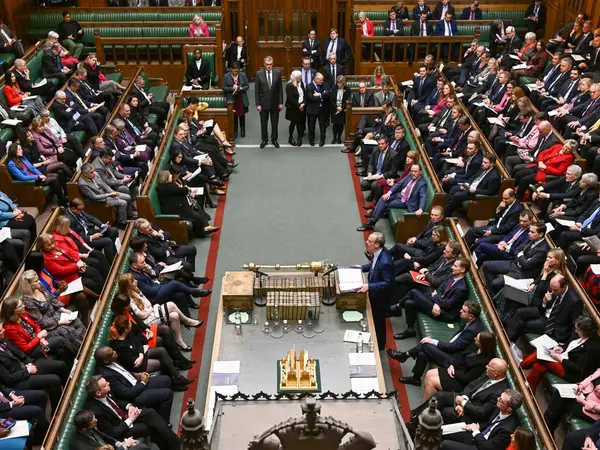Iran was a hot topic at a session of the UK House of Commons Wednesday with many lawmakers concerned about the impending executions of detained prisoners.
A wide range of Iran-related topics were discussed during the session, including how the UK can help support the protesters, prevent the Islamic Republic from another round of mass executions like the ones in 1988, and how to deal with the threats posed by Iran’s Revolutionary Guard both in the region and inside the UK.
The threats against Iran International and BBC Persian journalists were also mentioned by Conservative MP Bob Blackman, Shadow Minister for the Middle East and North Africa Bambos Charalambous, Parliamentary Under-Secretary of State for Americas and Caribbean David Rutley, and Shadow Minister of State for Security Holly Lynch.
The MPs were concerned that President Raisi, who is one of the main culprits behind the 1988 prisoner massacre that led to the killing of thousands, will orchestrate a similar carnage in cooperation with the IRGC and the judiciary.
The MPs referred to the death sentences handed to several protesters this week and expressed concerns that a similar fate will be expected for a large number of protesters, particularly following a call by 227 Iranian parliamentarians who are pushing for the death penalty. Moreover, calls for proscription of the IRGC are getting stronger in the British political sphere as they are the main force that would go on with the purge.
So far, nearly 400 protesters have been reported dead – including about 50 children – and over 15,000 have been detained since the current wave of protests engulfed Iran following the death in custody of 22-year-old Mahsa Amini, it was said. However, the figures are likely much higher, but the authorities do not release any data and obscure the ways for human right groups to obtain information.
Blackman said, “Contrary to the reports that the Minister mentioned, the reports I have are that more than 60,000 people have been arrested.” He added that “President Raisi, was responsible as the prosecutor in Iran for 30,000 executions of political prisoners in 1988, so the direction from the top is very clear... We are also aware that sentencing and executions are beginning in Iran, and that many thousands of people may end up being executed.”
Rutley argued that the threats to press freedom in Iran, now extended to the UK, were a sign of the regimes growing weakness in the face of ‘grassroots’ protests.
Describing the level of violence against protesters as “utterly appalling,” Rutley said, “The UK opposes the death penalty in all circumstances, but it is all the more abhorrent when those sentenced are being arrested for standing up for their rights.”
He added that “the frequency of these death sentences is only likely to increase as the regime processes the thousands of arrests that have been made during the protests. The Iranian judicial system is notorious for its lack of transparency and process, and this barbarism is just one of many threatening and intimidating techniques that the regime has rolled out in response to the protests.”
Blackman was another MP that asked the government to proscribe the IRGC as a terrorist group, but Rutley reiterated the government’s position of not commenting on potential proscriptions.
Speaking on behalf of the opposition, Charalambous and Lynch asked about the steps the UK Government is taking to protect journalists and UK nationals critical of the regime. In response, Rutley reiterated his previous points about summoning the Iranian Chargé d’affaires and the support being provided by the police.
Citing a report from MI5 of 10 assassination attempts on British residents this year, Lynch called for measures to remove the Islamic Republic-linked actors from the UK
She also asked what steps the government was taking to remove actors linked to the Iranian government from the UK citing a report from MI5 of 10 assassination attempts on British residents this year. Rutley’s response cited the Foreign Secretary’s warning to the Islamic Republic’s chargé d’affaires and promised that the Government would continue to monitor the situation.
Other contributors to the debate repeated Bob Blackman’s request about the need to proscribe the IRGC and for the Government to do more to support the protesters. Rutley’s responses made clear the Government’s support for the protesters, but they did not announce much by way of new measures.
